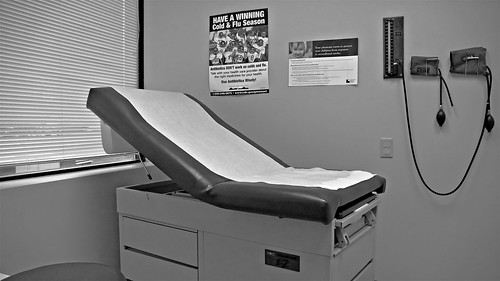
Image: Exam Room by Maggie Osterburg
Having an intimate examination can be uncomfortable enough, but the thought that a medical student might be examining you without your clear consent is hard to accept in 2011.Although Canada only introduced guidance that explicit consent from patients was needed for pelvic examinations less than six months ago (and following much dissent in the press), in the UK and Australia this has been established policy for many years. But researchers from Cardiff and Dundee universities who were exploring UK and Australian medical students 'professionalism dilemmas' found that the students often told stories of performing intimate examinations without consent. Sometimes they challenged being asked to perform an examination by a doctor-tutor, but more often the stories were of going along with requests despite knowing it was against their school's policy.
The researchers conclude that having a policy is not enough to change the behaviour of doctors who request students to practice examinations of patients without consent despite clear guidance which says this is wrong.
So where next? To try and quantify how common some of the professionalism dilemmas such as this are, the researchers are now carrying out a survey of all medical students in the UK which can be found here, and have set up a Facebook group to support the research. They also hope to study why the policies have not had the impact on doctor-tutors that would be expected.
Press Release from University of Dundee.
EDIT: Annabel Bentley has suggested that action needs to be taken. What do you think?
Rees CE, & Monrouxe LV (2011). Medical students learning intimate examinations without valid consent: a multicentre study. Medical education PMID: 21251051

